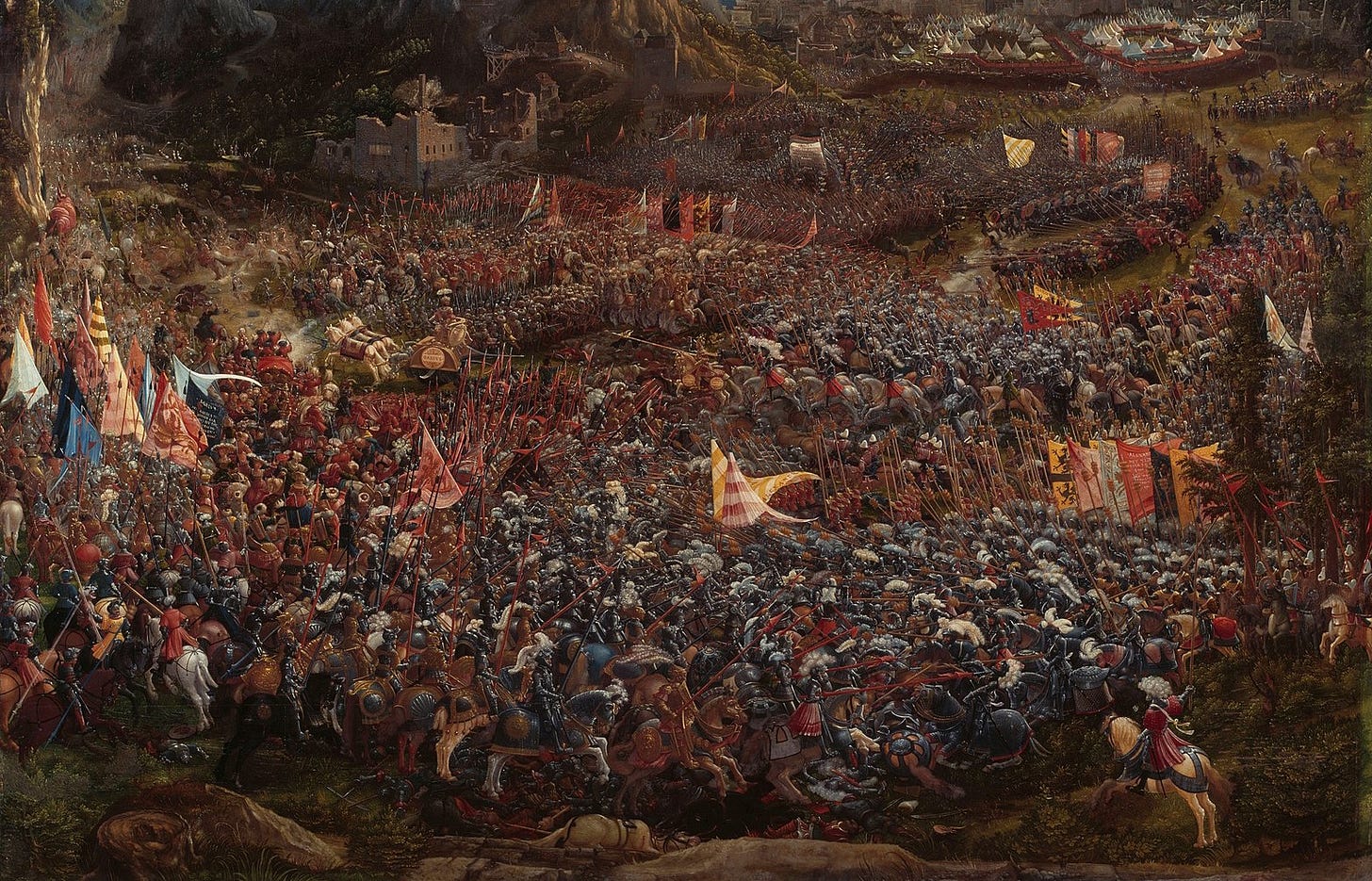5 Warning Signs Thy Partner Is Addicted to Massing Troops Along the Border
Is thy lover preparing for a major land war?

Dating someone who is addicted to invading enemy territory can be a difficult burden to bear.
If thou hast never experienced war fervor before, thou mayest not know what to look for. Often, it can begin with casual raids and logistical activities, and progressively grow into an insatiable lust for large movements of men and matériel.
Here are some warning signs to look for to tell if thy partner is addicted to massing troops along the border in preparation for a full scale invasion.
Thou Notices Infantry Battalions Going Missing
Thy partner is an experienced commander who hath always kept strict account of all forces at their disposal. If all of a sudden entire infantry battalions start disappearing, this is a tell-tale sign that they are deploying them along the frontier in secret.
They’ve Lost Interest in Minor Skirmishes
Skirmishes and raids are relatively low-casualty ways to satiate one’s bloodlust without starting a full on war. But they can serve as gateway tactics into larger military actions. If thy lover hath lost interest in minor skirmishes, chances are they have moved on to bigger and more dangerous operations.
A Family History of Starting Major Land Wars
Unfortunately, an obsession with large set-piece battles can be hereditary. If thy partner hath a family history of starting major land wars, there’s a chance they’ve inherited this appetite for glory.
Their Reconnaissance of Enemy Territory Is Deeper and More Frequent
Reconnaissance is continuous, even in tymes of peace. But if thou notices that thy lover is sending recon teams deep into enemy territory on a regular basis, they might be struggling with a troop massing problem.
They Say ‘Tis Just an Exercise
Often, a troop-massing addict will deny they have a problem by saying that their marshaling of the strategic reserves is merely an exercise. Sadly, they often believe this themselves. If thy partner is massing troops in what is clearly an invasion force and claiming ‘tis “just an exercise,” ‘tis tyme to get them help.
Addendum: The Last Feudal Levy (in England)
On 4 and 13 June, 1385 King Richard II of England issued summons to all of his tenants-in-chief1 to come pay fealty to him, and get ready to fight those pesky Scots that had been raiding his borders.2
This would be the last time the feudal levy was ever called in medieval England, and it did not go particularly well. Prior to this, it hadn’t been called since 1327, under Richard’s grandfather Edward III during the first year of his reign – also to fight the Scots, of course. At that time Scotland was led by Robert the Bruce, who, when he wasn’t busy fighting the English, enjoyed sitting in caves pondering spiders:
In 1385, England and France were in the middle of the Hundred Years’ War (1337-1453). France and Scotland had signed a treaty to support each other, and Richard decided it was high time for an invasion, because that’s just what you did when you were a king in 1385.
At the same time, a Franco-Burgundian force under Philip the Bold was planning to invade England, with Scottish support. In May of 1385, a force of around 2,000 French troops and 400 bowmen arrived in Edinburgh, and Philip began gathering a larger invasion force in the town of Sluis, in the modern-day Netherlands.

By this point in English history, it seems that the feudal levy had become a thing of the past, so why did Richard resort to it now? In June 1385, Richard II was only 18 years old, so maybe it was some sort of macho teenage “everybody-look-how-tough-I-am” kind of thing. Another theory is that, since it hadn’t been used in so long, he wanted to remind people who the boss was. Calling up the levy would remind people it was still a thing, hence putting them back in their lowly feudal place.
In practical terms, it was probably just a way to save money.
I don’t fully understand how the whole English military pay system worked at the time, but it seems that by calling the troops up through the levy instead of through whatever the normal means of mustering them was, the king didn’t have to pay them bonuses, or pay their ransoms if they got captured. The Wikipedia page for this describes the levied soldiers as “subcontractors.” Through the practice of scutage, a wealthy knight could also pay his way out of military service in a particular campaign. So through the levy Richard was invoking his due of scutage, basically saying “either come fight, or pay me.”
In any case, the feudal levy didn’t work out. Everybody got mad because they wanted their bonuses, and they forced Richard to withdraw it. It seems like calling the feudal levy up in the first place was a bad look for him because not only did his subjects force him to withdraw it, but now everybody knew how poor he was, too.
Philip the Bold’s plans to launch a major invasion from Sluis also fell through. Richard still invaded Scotland with a bunch of non-feudal-levied troops (you can’t just not invade Scotland). The articles of war he issued to his army for the campaign are a good read. Some highlights:
Item II, “that none be so hardy as to touch the body of our Lord, nor the vessel in which it is contained, under pain of being drawn, hanged and beheaded.” (Translation: don’t touch the king or you will be beheaded).
Item X, “that no one be so hardy as to cry ‘havok,’ under pain of losing his head, and that he or they that shall be the beginners of the said cry shall likewise be beheaded, and their bodies afterwards be hanged up by the arms.” (Translation: don’t yell “havok”3 in the middle of a battle or you will be beheaded).
Item XI, “that no one make the cry called mounté, or any other whatsoever in the army on account of the great danger that may thereby happen to the whole army; which God forbid! and that on pain, if he be a man at arms, or an archer on horseback, of losing his best horse; and if he be an archer on foot or boy he shall have his left ear cut off.” (Translation: don’t yell mounté, actually don’t yell anything for that matter, or the king will either take your horse or cut off your left ear).
Vassals who paid homage directly to the king, instead of to some other nobleman. These guys were pretty high up the food chain.
N. B. Lewis and J. J. N. Palmer, “The Feudal Summons of 1385,” The English Historical Review, Oct. 1985, https://www.jstor.org/stable/572563. Unfortunately it’s behind a paywall, and I couldn’t find many good free sources on the feudal levy of 1385. Go figure.
“Havok” was the signal for the troops to disperse and start pillaging. Read the full list of ordinances here: https://andyreiter.com/wp-content/uploads/military-justice/uk/Laws%20and%20Decrees/United%20Kingdom%20-%201385%20-%20Articles%20of%20War%20of%20Richard%20II.pdf




